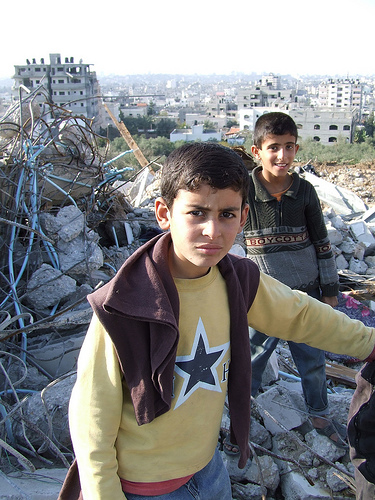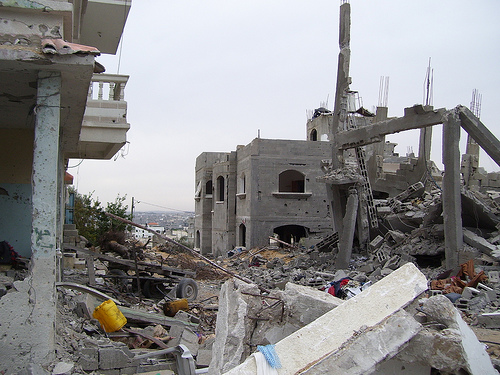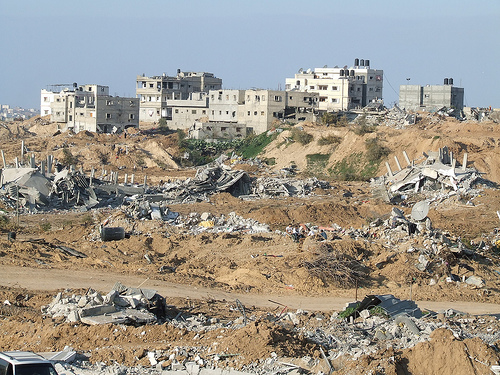Use the fabulous Obameter to follow Obama’s trail of kept, compromised, stalled and broken campaign promises.
So far 5 promises are kept, 1 compromise and 1 stalled!
Don’t miss dear Auntie Ziona’s take on Obama’s debut.
And definitely don’t miss Noam Chomsky’s comments on Obama’s fledgling stance toward Israel on Democracy Now! –
It’s approximately the Bush position. He began by saying that Israel, like any democracy, has a right to defend itself. That’s true, but there’s a gap in the reasoning. It has a right to defend itself. It doesn’t follow that it has a right to defend itself by force. So we might agree, say, that, you know, the British army in the United States in the colonies in 1776 had a right to defend itself from the terror of George Washington’s armies, which was quite real, but it didn’t follow they had a right to defend themselves by force, because they had no right to be here. So, yes, they had a right to defend themselves, and they had a way to do it—namely, leave. Same with the Nazis defending themselves against the terror of the partisans. They have no right to do it by force. In the case of Israel, it’s exactly the same. They have a right to defend themselves, and they can easily do it. One, in a narrow sense, they could have done it by accepting the ceasefire that Hamas proposed right before the invasion—I won’t go through the details—a ceasefire that had been in place and that Israel violated and broke.
But in a broader sense—and this is a crucial omission in everything Obama said, and if you know who his advisers are, you understand why—Israel can defend itself by stopping its crimes. Gaza and the West Bank are a unit. Israel, with US backing, is carrying out constant crimes, not only in Gaza, but also in the West Bank, where it is moving systematically with US support to take over the parts of the West Bank that it wants and to leave Palestinians isolated in unviable cantons, Bantustans, as Sharon called them. Well, stop those crimes, and resistance to them will stop.
Now, Israel has been able pretty much to stop resistance in the Occupied Territories, thanks in large part to the training that Obama praised by Jordan, of course with US funding and monitoring control. So, yes, they’ve managed to. They, in fact, have been suppressing demonstrations, even demonstrations, peaceful demonstrations, that called for support for the people of Gaza. They have carried out lots of arrests. In fact, they’re a collaborationist force, which supports the US and Israel in their effort to take over the West Bank.
Now, that’s what Obama—if Israel—there’s no question that all of these acts are in total violation of the foundations of international humanitarian law. Israel knows it. Their own advisers have told each other—legal advisers have explained that to them back in ’67. The World Court ruled on it. So it’s all total criminality. But they want to be able to persist without any objection. And that’s the thrust of Obama’s remarks. Not a single word about US-backed Israeli crimes, settlement development, cantonization, a takeover in the West Bank. Rather, everyone should be quiet and let the United States and Israel continue with it.
He spoke about the constructive steps of the peace—of the Arab peace agreement very selectively. He said they should move forward towards normalization of relations with Israel. But that wasn’t the main theme of the Arab League peace proposal. It was that there should be a two-state settlement, which the US blocks. I mean, he said some words about a two-state settlement, but not where or when or how or anything else. He said nothing about the core of the problem: the US-backed criminal activities both in Gaza, which they attacked at will, and crucially in the West Bank. That’s the core of the problem.
And you can understand it when you look at his advisers. So, say, Dennis Ross wrote an 800-page book about—in which he blamed Arafat for everything that’s happening—barely mentions the word “settlement” over—which was increasing steadily during the period when he was Clinton’s adviser, in fact peaked, a sharp increase in Clinton’s last year, not a word about it.
So the thrust of his remarks, Obama’s remarks, is that Israel has a right to defend itself by force, even though it has peaceful means to defend itself, that the Arabs must—states must move constructively to normalize relations with Israel, but very carefully omitting the main part of their proposal was that Israel, which is Israel and the United States, should join the overwhelming international consensus for a two-state settlement. That’s missing.

25th January 2009
– Photo & text courtesy of
Rafahkid
JUAN GONZALEZ: Noam Chomsky, I’d like to ask you about the enormous civilian casualties that have shocked the entire world in this last Israeli offensive. The Israelis claim, on the one hand, that it’s the unfortunate result of Hamas hiding among the civilian population, but you’ve said in a recent analysis that this has been Israeli policy almost from the founding of the state, the attack on civilian populations. Could you explain?
NOAM CHOMSKY: They say so. I was just quoting the chief of staff—this is thirty years ago, virtually no Palestinian terrorism in Israel, virtually. He said, “Our policy has been to attack civilians.” And the reason was explained—you know, villages, towns, so on. And it was explained by Abba Eban, the distinguished statesman, who said, “Yes, that’s what we’ve done, and we did it for a good reason. There was a rational prospect that if we attack the civilian population and cause it enough pain, they will press for a,” what he called, “a cessation of hostilities.” That’s a euphemism meaning cessation of resistance against Israel’s takeover of the—moves which were going on at the time to take over the Occupied Territories. So, sure, if they—“We’ll kill enough of them, so that they’ll press for quiet to permit us to continue what we’re doing.”
Actually, you know, Obama today didn’t put it in those words, but the meaning is approximately the same. That’s the meaning of his silence over the core issue of settling and takeover of the Occupied Territories and eliminating the possibility for any Palestinian meaningful independence, omission of this. But Eban [inaudible], who I was quoting, chief of staff, would have also said, you know, “And my heart bleeds for the civilians who are suffering. But what can we do? We have to pursue the rational prospect that if we cause them enough pain, they’ll call off any opposition to our takeover of their lands and resources.” But it was—I mean, I was just quoting it. They said it very frankly. That was thirty years ago, and there’s plenty more beside that.
JUAN GONZALEZ: And Obama’s call to open up Gaza, to end the blockade of Gaza on the Israelis, do you see that as any kind of a meaningful turn?
NOAM CHOMSKY: It would—those are nice words. And if he did it, that would be fine. But there isn’t any indication that he means it. In fact, this morning on the—Israel has already made it clear, stated explicitly, its foreign minister Tzipi Livni, that they’re not going to live up to the ceasefire until Gaza returns to them a captured soldier. Well, that avoids the fact that Israel is far in the lead, not in capturing soldiers, but in kidnapping civilians, hijacking ships, bringing them to Israel as hostages. In fact, one day before this Israeli soldier was captured at the border, Israeli forces entered Gaza and kidnapped two civilians and took them to Israel, where they were hidden away in the prison system sometime. So, and in fact, according to reports I just received from Israel—I can’t give you a source—they say that the radio news this morning has been reporting steadily that Amos Gilad, who’s the go-between between Israel and Egypt, notified the Egyptians that Israel is not interested in a ceasefire agreement, but rather an arrangement to stop the missiles and to free Gilad Shalit. OK, I presume that will be in the newspapers later. So, yes, it’s nice to say, “Let’s open the borders,” but not avoiding the conditions that are imposed, in fact, not even mentioning the fact that the borders have been closed for years because the United States has backed Israeli closure of them.
And again, his main point, which he started with, Israel, like any democracy, has a right to defend itself. That is true, but deceitful, because it has a right to defend itself, but not by force, especially when there are peaceful options that are completely open, the narrow one being a ceasefire, which the US and Israel would observe for the first time, and the second and the deeper one, by ending the crimes in the Occupied Territories.
AMY GOODMAN: Noam Chomsky, the timing of all of this—can you talk about Election Day here in the United States, November 4th, what exactly happened there, and then the fact that it went from Election Day to three days before the inauguration of Barack Obama, Israel’s announcement of the unilateral ceasefire?
NOAM CHOMSKY: On Election Day, November 4th, Israel violated—violently violated a ceasefire that had held, free will, in fact, a sharp reduction in rockets, probably not even from Hamas. It had been established in June or July. On November 4th, Election Day, presumably because the attention was shifted elsewhere, Israeli forces entered Gaza, killed half a dozen, what they call, militants, and the pretext was they found a tunnel in Gaza. Well, you know, from a military point of view, that’s an absurdity. If there was a tunnel and if it ever reached the Israeli border, they’d stop it right there. So this was obviously just a way to break the ceasefire, kill a couple of Hamas militants and ensure that the conflict would go on.
As for the bombing, it was very carefully timed. And, in fact, they’ve told us this. They’ve told us it was meticulously timed for months before the invasion, a very target-selected timing, everything. It began on a Saturday, timed at right before noon, when children were leaving schools, people milling in the streets of the densely populated city, perhaps the most densely in the world. That’s when it began. They killed a couple hundred people in the first few minutes.
And it ended—it was timed to end right before the inauguration. Now, presumably the reason was—Obama had kept silent about the atrocities and the killings, a horrible, horrible story, which you can see on Al Jazeera and little bits of it here. He had kept silent on the pretext that there’s only one president. Well, on Inauguration Day, that goes. There’s two—there’s a new president. And Israel surely wanted to make it—to ensure that he would not be in a position where he would have to say something about the ongoing atrocities. So they terminated it, probably temporarily, right before the inauguration. And then he could go on with what we heard today.
AMY GOODMAN: Noam Chomsky, I want to turn for a second to George Mitchell, who President Obama has tapped as the special envoy to the Middle East. Mitchell is the retired Senate majority leader, best known for helping to broker Northern Ireland’s landmark Good Friday Agreement in 1998, which ended decades of bloody conflict. In 2000, Mitchell was appointed by former president Bill Clinton to head a committee investigating ongoing Israeli-Palestinian violence. Sallai Meridor, Israel’s ambassador to Washington, welcomed Obama’s appointment of Mitchell, saying Israel holds him in, quote, “high regard.” This is some of what George Mitchell had to say yesterday.
GEORGE MITCHELL: The Secretary of State has just talked about our long-term objective, and the President himself has said that his administration—and I quote—“will make a sustained push, working with Israelis and Palestinians to achieve the goal of two states: a Jewish state in Israel and a Palestinian state living side by side in peace and security.”
This effort must be determined, persevering and patient. It must be backed up by political capital, economic resources, and focused attention at the highest levels of our government. And it must be firmly rooted in a shared vision of a peaceful future by the people who live in the region. At the direction of the President and the Secretary of State, and in pursuit of the President’s policies, I pledge my full effort in the search for peace and stability in the Middle East.
AMY GOODMAN: Obama’s new Middle East envoy, former senator George Mitchell. Noam Chomsky, your response?
NOAM CHOMSKY: In Ireland, Mitchell did quite a commendable job. But notice that in Ireland, there was an objective, and he helped realize that objective: peaceful reconciliation. Britain took into account for the first time the grievances of the population, and the terror stopped. OK? And the terror was quite real.
In Israel, again, you have to look at what he avoided. He says, “Yes, we want to have a Palestinian state.” Where? OK? He said not a word about—lots of pleasantries about everyone should live in peace, and so on, but where is the Palestinian state? Nothing said about the US-backed actions continuing every day, which are undermining any possibility for a viable Palestinian state: the takeover of the territory; the annexation wall, which is what it is; the takeover of the Jordan Valley; the salients that cut through the West Bank and effectively trisect it; the hundreds of mostly arbitrary checkpoints designed to make Palestinian life impossible—all going on, not a word about them.
So, OK, we can have—in fact, you know, the first Israeli government to talk about a Palestinian state, to even mention the words, was the ultra right-wing Netanyahu government that came in 1996. They were asked, “Could Palestinians have a state?” Peres, who had preceded them, said, “No, never.” And Netanyahu’s spokesman said, “Yeah, the fragments of territory that we leave to them, they can call it a state if they want. Or they can call it fried chicken.” Well, that’s basically the attitude.
And Mitchell had nothing to say about it. He carefully avoided what he knows for certain is the core problem: the illegal, totally illegal, the criminal US-backed actions, which are systematically taking over the West Bank, just as they did under Clinton, and are undermining the possibility for a viable state.
JUAN GONZALEZ: Noam Chomsky, for Americans who want to figure out how to move now with the new Obama administration to end these atrocities that are occurring in the Middle East, what do you suggest? And also, what’s your viewpoint of the divestment movement? Many young people are urging something similar to South Africa, to begin pressing increasingly for divestment from Israel.
NOAM CHOMSKY: The position that people who are interested in peace ought to take is very straightforward. I mean, a majority of the American population, considerable majority, already agree with the full Arab League peace plan, not the little sliver of it that Obama mentioned. The peace plan calls for a two-state settlement on the international border, maybe with minor modifications. That’s an overwhelming national consensus. The Hamas supports it. Iran has said, you know, they’ll go along with it.
AMY GOODMAN: Noam, we only have thirty seconds.
NOAM CHOMSKY: OK, so we should push for that.
Is divestment a proper tactic? Well, you know, if you look back at South Africa, divestment became a proper tactic after years, decades of education and organizing, to the point where Congress was legislating against trade, corporations were pulling out, and so on. That’s what’s missing: the education and organizing which makes it an understandable move. And, in fact, if we ever got to that point, you wouldn’t even need it, because the US could be brought in line with international opinion.
Jews sans Frontieres makes some steely criticisms of Chomsky’s sketchy flippancy about boycotts, divestments and sanctions with excellent historical perspective on international efforts to defeat apartheid.
His answer is weak and sadly unbecoming for his record. … It feels awkward and sad to explain to Chomsky elementary principles of grassroots organizing, but he leaves me no choice. Do you educate people about nuclear weapons before you campaign against them, or do you educate people about nuclear weapons by campaigning against them? Did the Civil Rights movement in the U.S. spend years explaining civil rights to white people before demanding civil rights for African-Americans? Of course not. A campaign of public education without a commitment and a strategy for applying pressure is not a movement.
Chomsky last comment is that because of the power of the U.S. over Israel, the B.D.S. campaign would be superfluous the moment it becomes possible. That, as Franz Kafka pointed out, is also true of the Messiah. And I’m afraid that Chomsky’s recommendation isn’t too different from waiting for the Messiah. Any campaign that succeeds in its objectives becomes superfluous. And any campaign that challenges entrenched power in a major way looks hopeless when it starts. Besides, B.D.S. is not a U.S. campaign. It is a global strategy against apartheid coordinated by the united Palestinian B.D.S. National Committee. Despite its young age and daunting task, it is a campaign that already works. Every little success draws howls of protest from Israel, as well as attempts to deflect criticism. For example, only after the success of the British academic boycott resolution did the heads of Israeli universities for the first time ever issue a public statement criticizing the occupation for its effects on Palestinian education. The best evidence to the value and effectiveness of B.D.S. is the amount of fear it instills in Israel and its apologists.
Here’s Chomsky again interviewed on January 24, this time by PressTV – he’s flying lately – will Obama’s new czars take notice?
Press TV: Professor Chomsky, we better start with Pakistan. The White House not commenting on the killings of people [in cross-border drone attacks from Afghanistan into Pakistan]. Richard Holbrooke, someone whom you’ve written about in the context of Yugoslavia, is the man [President Barack] Obama has chosen to solve the situation.
Chomsky: Well, it was pretty clear that Obama would accept the Bush doctrine that the United States can bomb Pakistan freely, and there have been many case which are quite serious.
There has been for example a great deal of chaos and fighting in Bajaur province, which is a adjacent to Afghanistan and tribal leaders- others there- have traced it to the bombing of a madrassa school which killed 80 to 95 people, which I don’t think was even reported in the United states, it was reported in the Pakistani press of course.
The author of the article reporting it, a well-known nuclear physicist, Pervez Hoodbhoy pointed out at the time that this kind of massacre will of course engender terror and reactions, which will even threaten the state of Pakistan. And that has been what is happening. We are now seeing more of it.
The first message of the Pakistani government to General [David] Petraeus, the American General when he took command of the region was that they did not want any more bombings in Pakistan.
Actually, the first message to the new Obama administration by President [Hamid] Karzai of Afghanistan was the same, that he wanted no more bombings. He also said that he wants a timetable for the withdrawal of the foreign troops, US and other troops, from Afghanistan. That was of course just ignored.
Press TV: And these three foreign envoys, well the third one has not been announced yet perhaps, but some people are expressing optimism about George Mitchell’s position as Middle East envoy.
Richard Holbrooke, which have looked at. We have talked to the former Bosnian foreign minister here, who seemed to imply that he may even have had a role in the say so for the Srebrenica massacre, and of course, Dennis Ross is being talked about as an envoy for Iran.
Chomsky: well Holbrooke has a pretty awful record, not so much Yugoslavia, but earlier. For example, In the Indonesian atrocities in eastern Timor, where he was the official in charge, and evaded to stop the US support for them, and all together it’s a very spotty record.
George Mitchell is, of the various appointments that have been made, he is the most decent let’s say. He has a pretty decent record. He achieved something in Northern Ireland, but of course, in that case there was an objective.
The objective was that the British would put an end to the resort to violence in response to IRA terror and would attend to the legitimate grievances that were the source of the terror. He did manage that, Britain did pay attention to the grievances, and the terror stopped- so that was successful.
But there is no such outcome sketched in the Middle East, specially the Israel-Palestine problem. I mean, there is a solution, a straightforward solution very similar to the British one. Israel could stop its US-backed crimes in the occupied territories and then presumably the reaction to them would stop. But that’s not on the agenda.
In fact, President Obama just had a press conference, which was quite interesting in that respect. He praised the parabolic peace initiative, the Saudi initiative endorsed by the Arab League, and said it had constructive elements. It called for the normalization of relation with Israel, and he called on the Arab states to proceed with those “constructive elements,” namely the normalization of relations.
But that is a gross falsification of the Arab League initiative. The Arab League initiative called for accepting a two-state settlement on the international border, which has been a long-standing international consensus and said if that can be achieved then Arab states can normalize relations with Israel.
Well, Obama skipped the first part, the crucial part, the core of the resolution, because that imposes an obligation on the United States. The United States has stood alone for over thirty years in blocking this international consensus, by now it has totally isolated the US and Israel.
Europe and now a lot of other countries have accepted it. Hamas has accepted it for years, the Palestinian Authority of course, the Arab League now for many years [have accepted it]. The US and Israel block it, not just in words, but they are blocking it in actions constantly, (this is) happening every day in the occupied territories and also in the siege of Gaza and other atrocities.
So when he skips that it is purposeful. That entails that the US is not going to join the world in seeking to implement a diplomatic settlement, and if that is the case, Mitchell’s mission is vacuous.
Press TV: Is there a contradiction in that George Mitchell of course did speak to members of the Sinn Féin, their military wing of course of the IRA.
At the same time, well on this channel [Press TV] we have been covering the Gaza conflict, its headquarters were bombed, and now we are being told that Israeli soldiers will not give their names, and the names of people are not being released for fear of prosecution.
And yet, some were saying that Obama did say that the border should be opened. Should we see any change in policy there?
Chomsky: He did say that, but he did not mention the fact that it was in the context of a lot other demands. And Israel will also say, sure the borders should be opened but he still refuses to speak to the elected government (i.e. Hamas), quite different from Mitchell in Northern Ireland.
It means Palestinians will have to be punished for voting in a free election, the way the US did not want them to, and he endorsed the Condoleezza Rice-Tzipi Livni agreement to close the Egyptian-Gaza order, which is quite an act of imperial arrogance.
It is not their border, and in fact, Egypt strongly objected to that. But Obama continued. He says we have to make sure that no arms are smuggled through the tunnels into the Gaza Strip. But he said nothing about the vast dispatch of far more lethal arms to Israel.
In fact, right in the middle of the Gaza attack, December 31, the Pentagon announced that it was commissioning a German ship to send 3,000 tons of war material to Israel. That did not work out, because the government of Greece prevented it but it was supposed to go through Greece but it could all go through somewhere else. This is right in the middle of the attack on Gaza.
Actually there were very little reporting, very few inquiries. The Pentagon responded in an interesting way. They said, well this material won’t be used for the attack on Gaza, in fact they knew that Israel had plans to stop the attack right before the inauguration, so that Obama would not have to say anything about it.
But the Pentagon said that this material is being used for pre-positioning for US forces. In other words, this has been going for a long time, but this is extending and reinforcing the role of Israel as a US military base on the edge of the major oil producing regions of the world. If they are ever asked why they are doing it, they will say for defense or stability, but it is just a base for further aggressive action.
Press TV: Robert Gates and Admiral [Mike] Mullen have been talking about the 16-month timeline for withdrawal from Iraq is just one of the options, a slight difference from what Obama has been saying in the campaign. And, Hillary Clinton famously said she was prepared to obliterate all of Iran and kill 70 million citizens. On Iraq and Iran what do you see as changes?
Chomsky: What happened in Iraq is extremely interesting and important. The few correspondents with real experience any whom know something have understood it. Patrick Cockburn, Jonathan Steele and one or two others.
What has happened is that there was a remarkable campaign of non-violent resistance in Iraq, which compelled the United States, step-by-step, to back away from its programs and its goals. They compelled the US occupying forces to allow an election, which the US did not want and tried to evade in all sorts of ways.
Then they went on from there to force the United States to accept at least formally a status of forces agreement, which if the Obama administration lives up to it, will abandon most of the US war aims. It will eliminate the huge permanent military bases that the US has built in Iraq. It will mean the US will not control decisions over how the oil resources will be accessed and used. And in fact just every war aim is gone.
Of course there is a question of whether the US will live up to it and what you are reporting is among the serious indications that they are trying to evade living up to it. But what happened there is really significant, and a real credit to the people of Iraq, who have suffered miserably. I mean, the country has been absolutely destroyed, but they did manage to get the US to back away formally from its major war aims.
In the case of Iran, Obama’s statements have not been as inflammatory as Clinton’s, but they amount to pretty much the same thing. He said all options are open. Well, what does all options mean? Presumably that includes nuclear war, you know, that is an option.
There is no indication that he is willing to take the steps, say, that the American population wants. An overwhelming majority of the American population for years has been in favor, has agreed with the Non-Aligned Movement, that Iran should have the rights granted to the signers of the non-proliferation treaty, in fact to develop nuclear energy.
It should not have the right to develop nuclear weapons, and more interestingly about the same percentages, about 75 to 80%, call for the establishment of a nuclear weapons free zone in the region, which would include Iran, Israel, and any US forces deployment there, within all kinds of verifications and so on.
That could eliminate probably one of the major sources of the conflict. There is no indication that the Obama administration has any thought of doing anything about this.
Press TV: Just finally Professor Chomsky, the US economy, of course where you are -that is dominating the news and the lives all Americans and arguably the people around the world- and this 825 billion dollar package. How do you think the Obama people are going to handle this?
Chomsky: Nobody really knows. I mean, what is happening with the economy is not well understood. It is based on extremely opaque financial manipulations, which are quite hard to decode. I mean, the general process is understood, but whether the $800 billion, or probably larger government stimulus, will overcome this crisis, is not known.
The first $350 billion have already been spent- that is the so-called part bailout but that went into the pockets of banks. They were supposed to start lending freely, but they just decided not to do it. They would rather enrich themselves, restore their own capital, and take over other banks- mergers and acquisition and so on.
Whether the next stimulus will have an effect depends very much on how it is handled, whether it is monitored, so that it is used for constructive purposes. [It relies] also on factors that are just not known, like how deep this crisis is going to be.
It is a worldwide crisis and it is very serious. It is suddenly striking that the ways that Western countries are approaching the crisis is exactly the same as the model that they enforce on the Third World when there is a crisis.
So when Indonesia has a crisis, Argentina and everyone else, they are supposed to raise interest rates very high and privatize the economy, and cut down on public spending, measures like that. In the West, it is the exact opposite: lower interest rates to zero, move towards nationalization if necessary, pour money into the economy, have huge debts.
That is exactly the opposite of how the Third World is supposed to pay off its debts, and that this seems to pass without comment is remarkable. These measures for the West are ones that might get the economy moving again, while it has been a disaster for others.
26 January
Chomsky continues his analyses on ZNet with a piece “Obama on Israel-Palestine”:
Barack Obama is recognized to be a person of acute intelligence, a legal scholar, careful with his choice of words. He deserves to be taken seriously – both what he says, and what he omits. Particularly significant is his first substantive statement on foreign affairs, on January 22, at the State Department, when introducing George Mitchell to serve as his special envoy for Middle East peace.
Mitchell is to focus his attention on the Israel-Palestine problem, in the wake of the recent US-Israeli invasion of Gaza. During the murderous assault, Obama remained silent apart from a few platitudes, because, he said, there is only one president – a fact that did not silence him on many other issues. His campaign did, however, repeat his statement that “if missiles were falling where my two daughters sleep, I would do everything in order to stop that.” He was referring to Israeli children, not the hundreds of Palestinian children being butchered by US arms, about whom he could not speak, because there was only one president.
On January 22, however, the one president was Barack Obama, so he could speak freely about these matters – avoiding, however, the attack on Gaza, which had, conveniently, been called off just before the inauguration.
Obama’s talk emphasized his commitment to a peaceful settlement. He left its contours vague, apart from one specific proposal: “the Arab peace initiative,” Obama said, “contains constructive elements that could help advance these efforts. Now is the time for Arab states to act on the initiative’s promise by supporting the Palestinian government under President Abbas and Prime Minister Fayyad, taking steps towards normalizing relations with Israel, and by standing up to extremism that threatens us all.”
Obama is not directly falsifying the Arab League proposal, but the carefully framed deceit is instructive.
The Arab League peace proposal does indeed call for normalization of relations with Israel – in the context – repeat, in the context of a two-state settlement in terms of the longstanding international consensus, which the US and Israel have blocked for over 30 years, in international isolation, and still do. The core of the Arab League proposal, as Obama and his Mideast advisers know very well, is its call for a peaceful political settlement in these terms, which are well-known, and recognized to be the only basis for the peaceful settlement to which Obama professes to be committed. The omission of that crucial fact can hardly be accidental, and signals clearly that Obama envisions no departure from US rejectionism. His call for the Arab states to act on a corollary to their proposal, while the US ignores even the existence of its central content, which is the precondition for the corollary, surpasses cynicism.
The most significant acts to undermine a peaceful settlement are the daily US-backed actions in the occupied territories, all recognized to be criminal: taking over valuable land and resources and constructing what the leading architect of the plan, Ariel Sharon, called “Bantustans” for Palestinians – an unfair comparison because the Bantustans were far more viable than the fragments left to Palestinians under Sharon’s conception, now being realized. But the US and Israel even continue to oppose a political settlement in words, most recently in December 2008, when the US and Israel (and a few Pacific islands) voted against a UN resolution supporting “the right of the Palestinian people to self-determination” (passed 173 to 5, US-Israel opposed, with evasive pretexts).
Obama had not one word to say about the settlement and infrastructure developments in the West Bank, and the complex measures to control Palestinian existence, designed to undermine the prospects for a peaceful two-state settlement. His silence is a grim refutation of his oratorical flourishes about how “I will sustain an active commitment to seek two states living side by side in peace and security.”
Also unmentioned is Israel’s use of US arms in Gaza, in violation not only of international but also US law. Or Washington’s shipment of new arms to Israel right at the peak of the US-Israeli attack, surely not unknown to Obama’s Middle East advisers.
Obama was firm, however, that smuggling of arms to Gaza must be stopped. He endorses the agreement of Condoleeza Rice and Israeli foreign minister Tzipi Livni that the Egyptian-Gaza border must be closed – a remarkable exercise of imperial arrogance, as the Financial Times observed: “as they stood in Washington congratulating each other, both officials seemed oblivious to the fact that they were making a deal about an illegal trade on someone else’s border – Egypt in this case. The next day, an Egyptian official described the memorandum as `fictional’.” Egypt’s objections were ignored.
Returning to Obama’s reference to the “constructive” Arab League proposal, as the wording indicates, Obama persists in restricting support to the defeated party in the January 2006 election, the only free election in the Arab world, to which the US and Israel reacted, instantly and overtly, by severely punishing Palestinians for opposing the will of the masters. A minor technicality is that Abbas’s term ran out on January 9, and that Fayyad was appointed without confirmation by the Palestinian parliament (many of them kidnapped and in Israeli prisons). Ha’aretz describes Fayyad as “a strange bird in Palestinian politics. On the one hand, he is the Palestinian politician most esteemed by Israel and the West. However, on the other hand, he has no electoral power whatsoever in Gaza or the West Bank.” The report also notes Fayyad’s “close relationship with the Israeli establishment,” notably his friendship with Sharon’s extremist adviser Dov Weiglass. Though lacking popular support, he is regarded as competent and honest, not the norm in the US-backed political sectors.
Obama’s insistence that only Abbas and Fayyad exist conforms to the consistent Western contempt for democracy unless it is under control.
Obama provided the usual reasons for ignoring the elected government led by Hamas. “To be a genuine party to peace,” Obama declared, “the quartet [US, EU, Russia, UN] has made it clear that Hamas must meet clear conditions: recognize Israel’s right to exist; renounce violence; and abide by past agreements.” Unmentioned, also as usual, is the inconvenient fact that the US and Israel firmly reject all three conditions. In international isolation, they bar a two-state settlement including a Palestinian state; they of course do not renounce violence; and they reject the quartet’s central proposal, the “road map.” Israel formally accepted it, but with 14 reservations that effectively eliminate its contents (tacitly backed by the US). It is the great merit of Jimmy Carter’s Palestine: Peace not Apartheid, to have brought these facts to public attention for the first time – and in the mainstream, the only time.
It follows, by elementary reasoning, that neither the US nor Israel is a “genuine party to peace.” But that cannot be. It is not even a phrase in the English language.
It is perhaps unfair to criticize Obama for this further exercise of cynicism, because it is close to universal, unlike his scrupulous evisceration of the core component of the Arab League proposal, which is his own novel contribution.
Also near universal are the standard references to Hamas: a terrorist organization, dedicated to the destruction of Israel (or maybe all Jews). Omitted are the inconvenient facts that the US-Israel are not only dedicated to the destruction of any viable Palestinian state, but are steadily implementing those policies. Or that unlike the two rejectionist states, Hamas has called for a two-state settlement in terms of the international consensus: publicly, repeatedly, explicitly.
Obama began his remarks by saying: “Let me be clear: America is committed to Israel’s security. And we will always support Israel’s right to defend itself against legitimate threats.”
There was nothing about the right of Palestinians to defend themselves against far more extreme threats, such as those occurring daily, with US support, in the occupied territories. But that again is the norm.
Also normal is the enunciation of the principle that Israel has the right to defend itself. That is correct, but vacuous: so does everyone. But in the context the cliche is worse than vacuous: it is more cynical deceit.
The issue is not whether Israel has the right to defend itself, like everyone else, but whether it has the right to do so by force. No one, including Obama, believes that states enjoy a general right to defend themselves by force: it is first necessary to demonstrate that there are no peaceful alternatives that can be tried. In this case, there surely are.
A narrow alternative would be for Israel to abide by a cease-fire, for example, the cease-fire proposed by Hamas political leader Khaled Mishal a few days before Israel launched its attack on December 27. Mishal called for restoring the 2005 agreement. That agreement called for an end to violence and uninterrupted opening of the borders, along with an Israeli guarantee that goods and people could move freely between the two parts of occupied Palestine, the West Bank and the Gaza Strip. The agreement was rejected by the US and Israel a few months later, after the free election of January 2006 turned out “the wrong way.” There are many other highly relevant cases.
The broader and more significant alternative would be for the US and Israel to abandon their extreme rejectionism, and join the rest of the world – including the Arab states and Hamas – in supporting a two-state settlement in accord with the international consensus. It should be noted that in the past 30 years there has been one departure from US-Israeli rejectionism: the negotiations at Taba in January 2001, which appeared to be close to a peaceful resolution when Israel prematurely called them off. It would not, then, be outlandish for Obama to agree to join the world, even within the framework of US policy, if he were interested in doing so.
In short, Obama’s forceful reiteration of Israel’s right to defend itself is another exercise of cynical deceit – though, it must be admitted, not unique to him, but virtually universal.
The deceit is particularly striking in this case because the occasion was the appointment of Mitchell as special envoy. Mitchell’s primary achievement was his leading role in the peaceful settlement in northern Ireland. It called for an end to IRA terror and British violence. Implicit is the recognition that while Britain had the right to defend itself from terror, it had no right to do so by force, because there was a peaceful alternative: recognition of the legitimate grievances of the Irish Catholic community that were the roots of IRA terror. When Britain adopted that sensible course, the terror ended. The implications for Mitchell’s mission with regard to Israel-Palestine are so obvious that they need not be spelled out. And omission of them is, again, a striking indication of the commitment of the Obama administration to traditional US rejectionism and opposition to peace, except on its extremist terms.
Obama also praised Jordan for its “constructive role in training Palestinian security forces and nurturing its relations with Israel” – which contrasts strikingly with US-Israeli refusal to deal with the freely elected government of Palestine, while savagely punishing Palestinians for electing it with pretexts which, as noted, do not withstand a moment’s scrutiny. It is true that Jordan joined the US in arming and training Palestinian security forces, so that they could violently suppress any manifestation of support for the miserable victims of US-Israeli assault in Gaza, also arresting supporters of Hamas and the prominent journalist Khaled Amayreh, while organizing their own demonstrations in support of Abbas and Fatah, in which most participants “were civil servants and school children who were instructed by the PA to attend the rally,” according to the Jerusalem Post. Our kind of democracy.
Obama made one further substantive comment: “As part of a lasting cease-fire, Gaza’s border crossings should be open to allow the flow of aid and commerce, with an appropriate monitoring regime…” He did not, of course, mention that the US-Israel had rejected much the same agreement after the January 2006 election, and that Israel had never observed similar subsequent agreements on borders.
Also missing is any reaction to Israel’s announcement that it rejected the cease-fire agreement, so that the prospects for it to be “lasting” are not auspicious. As reported at once in the press, “Israeli Cabinet Minister Binyamin Ben-Eliezer, who takes part in security deliberations, told Army Radio on Thursday that Israel wouldn’t let border crossings with Gaza reopen without a deal to free [Gilad] Schalit” (AP, Jan 22); ‘Israel to keep Gaza crossings closed…An official said the government planned to use the issue to bargain for the release of Gilad Shalit, the Israeli soldier held by the Islamist group since 2006 (Financial Times, Jan. 23); “Earlier this week, Israeli Foreign Minister Tzipi Livni said that progress on Corporal Shalit’s release would be a precondition to opening up the border crossings that have been mostly closed since Hamas wrested control of Gaza from the West Bank-based Palestinian Authority in 2007” (Christian Science Monitor, Jan. 23); “an Israeli official said there would be tough conditions for any lifting of the blockade, which he linked with the release of Gilad Shalit” (FT, Jan. 23); among many others.
Shalit’s capture is a prominent issue in the West, another indication of Hamas’s criminality. Whatever one thinks about it, it is uncontroversial that capture of a soldier of an attacking army is far less of a crime than kidnapping of civilians, exactly what Israeli forces did the day before the capture of Shalit, invading Gaza city and kidnapping two brothers, then spiriting them across the border where they disappeared into Israel’s prison complex. Unlike the much lesser case of Shalit, that crime was virtually unreported and has been forgotten, along with Israel’s regular practice for decades of kidnapping civilians in Lebanon and on the high seas and dispatching them to Israeli prisons, often held for many years as hostages. But the capture of Shalit bars a cease-fire.
Obama’s State Department talk about the Middle East continued with “the deteriorating situation in Afghanistan and Pakistan… the central front in our enduring struggle against terrorism and extremism.” A few hours later, US planes attacked a remote village in Afghanistan, intending to kill a Taliban commander. “Village elders, though, told provincial officials there were no Taliban in the area, which they described as a hamlet populated mainly by shepherds. Women and children were among the 22 dead, they said, according to Hamididan Abdul Rahmzai, the head of the provincial council” (LA Times, Jan. 24).
Afghan president Karzai’s first message to Obama after he was elected in November was a plea to end the bombing of Afghan civilians, reiterated a few hours before Obama was sworn in. This was considered as significant as Karzai’s call for a timetable for departure of US and other foreign forces. The rich and powerful have their “responsibilities.” Among them, the New York Times reported, is to “provide security” in southern Afghanistan, where “the insurgency is homegrown and self-sustaining.” All familiar. From Pravda in the 1980s, for example.
Siegman’s criticisms of US policy in regard to Israel remain more sustainable and trenchant.













